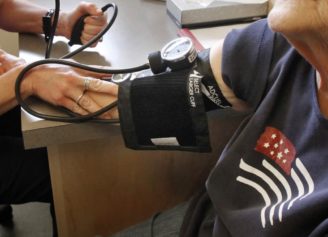Brain aneurysms are weak areas in the arteries that carry blood to the brain. Many people have aneurysms and aren’t even aware of them, since the aneurysm often doesn’t cause any symptoms. That is, until the aneurysm ruptures and causes a rush of blood to the skull, which results in a stroke.
In some instances, other symptoms could be an indication of an aneurysm. Slurred speech, blurry vision and severe head and neck pain can be signs of an aneurysm. The intensity of the pain can serve as a way to tell just how bad the aneurysm is. If the neck or head are hurting more on one side than the other, this indicates where in the body the aneurysm is located. Fainting or extreme sensitivity to light can also be a sign that a brain aneurysm is present. Seizures and aneurysms are often connected as well.
Family history is the biggest risk factor for aneurysm development. People who have a parent, child or sibling who had a brain aneurysm are two to seven times more likely to have an aneurysm. Studies show that African-Americans are more likely than white Americans to have subarachnoid hemorrhage. Smoking also increases the risk. Studies also show that women are more likely to have an aneurysm than men.
One of the best ways to prevent brain aneurysms is to stop smoking. Smoking not only increases aneurysm risk but can cause high blood pressure, which increases the likelihood of aneurysms. Obesity is also a brain aneurysm risk factor, so adopting a healthy diet and exercise plan to lose weight can reduce the chances of aneurysm development significantly.
Thyroid malfunction can also lead to brain aneurysms, since thyroid problems can lead to hypertension. Studies indicate that about 20 million Americans have some form of thyroid disease. However, Black Americans and Asian Americans are more likely to develop Graves’ disease, which is characterized by an overproduction of thyroid hormones. Graves’ disease symptoms include anxiety, sensitivity to heat, bulging eyes, rapid heartbeat and changes in libido.
The Aneurysm and AVM Foundation asserts that oral contraceptives can increase brain aneurysm risk as well. Women with a family history of aneurysms and/or women who smoke should talk to their doctors about alternate forms of contraception as a health precaution.


